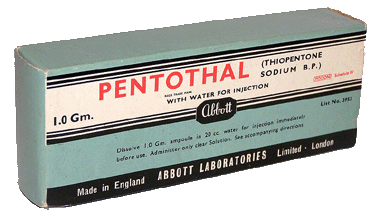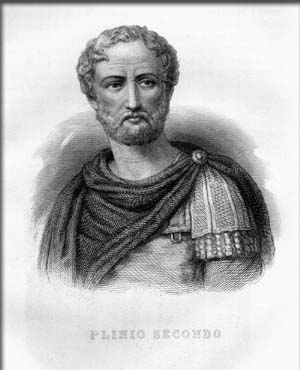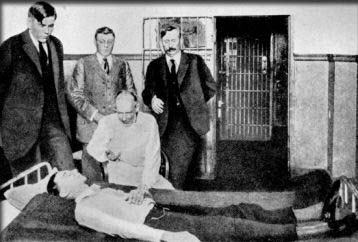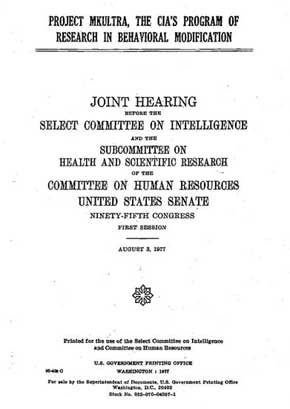The
Truth about Truth Serums
 A
staple of old spy films, can you actually inject somebody with
a drug that will make them reliably spill the beans to you?
A
staple of old spy films, can you actually inject somebody with
a drug that will make them reliably spill the beans to you?
The
modern idea of a drug that could ensure someone is telling the
truth originated with a doctor named Robert House in 1916. House
was an obstetrician that practiced in a small town called Ferris
just outside of Dallas, Texas. While delivering a baby on September
7 of that year, he injected the mother with scopolamine
as a pain killer putting her into a state of "twilight sleep."
After the baby was born House asked the father if he had a small
set of scales to weigh the baby, but the father didn't know
where they were located. His wife, apparently still asleep,
however, spoke up and said, 'They are in the kitchen on a nail
behind the picture." (Which they were).
The
wife, when she awoke, neither remembered the incident nor any
of the pain associated with the delivery. It occurred to House
that somehow the drug had shut down the higher levels of the
brain while leaving her mind still able to answer simple questions.
As he experimented with it he became convinced that the answers
given under scopolamine where always completely truthful and
the drug could be used for forensic inquiries.
House
wasn't the first person to notice that certain substances affected
the brain and elicited truthful answers. The Roman natural philosopher
Pliny the Elder supposedly said, In vino veritas which
translates to "in wine there is truth" after observing the how
intoxicated people often speak what's in their mind without
regard to the consequences.
|

Pliny
the Elder felt that wine would get at the truth.
|
House
thought scopolamine, however, would be a lot more reliable in
eliciting truth than a bottle of Burgundy and went on a campaign
to see it adopted as a standard law-enforcement tool.
To his
credit, House wasn't as interested in convicting people of crimes
with the drug as he was at proving their innocence. In a least
one experiment House was able to show that the subject in question,
a man named Scrivener, while under influence of the drug, denied
being involved in a robbery for which he was being prosecuted.
Later it was shown that Scrivener was indeed in another city
at the time of the crime (in police custody), just like he had
said under the influence of the drug.
House
became an enthusiastic proponent of the drug's use and in the
years following his observations police departments experimented
with scopolamine and other similar drugs (scopolamine itself
had a number of undesireable side effects that limited its use).
One of the other popular substances used for this purpose was
sodium thiopental (marketed under the brand name Sodium
Pentothal).
Sodium
Pentothal
Sodium
Pentothal is member of a class of drugs called "barbiturates"
that depress the nervous system (similar to the effects of alcohol).
It tends to decrease inhibitions and slow creative thinking,
making it harder to come up with and remember lies. While it
is popular to refer to any of these drugs as truth serums neither
scopolamine nor Sodium Pentothal is a serum. The use of the
word is a misnomer as serums are derived from animal blood and
used mainly for inoculations against diseases.
In 1963
the United States Supreme court ruled that confessions that
came as a result drugs were "unconstitutionally coerced" and
couldn't be used in court. In addition, experts had come to
the conclusion that things said under the influence of the drugs
were also unreliable. They might be the truth, they might be
a fantasy or they might be the result of the drugged person
just trying to please the questioner.
|

Dr.
Robert House injects an inmate in prison in an experiment
to find the truth.
|
This
made the truth serums of limited interest to the law enforcement
community. However, they did have some medical use to psychiatrics
as they could be administered to patients who had been through
a trauma and they seemed to assist them in talking about their
experience. This, in turn, made the patients feel better and
it didn't really matter if what they were saying was the objective
truth or only something that they believed.
The
CIA and Mind Control
Even
though law enforcement lost interest in truth serums as any
evidence they uncovered could not be used in court, intelligence
agencies still found them interesting. The information the spy
agencies needed wasn't necessarily something that would useful
in a court room.
In fact,
starting right after World War II the CIA conducted a program
designed not just to produce a drug that would force a subject
to answer truthfully, but also to control a person's mind and
get them to do things they would not normally have done.
The
program, best known as MKUltra, ran from about 1950 through
the early 1970's under various names. Much of what was done
turned out to be illegal and unethical. A favorite drug of choice
by these experiments was Lysergic acid diethylamide (LSD).
LSD is a powerful agent that causes visual hallucinations and
illusions (colloquially known as "trips"). It is odorless and
tasteless and the effect can last for as long as 12 hours.
Experiments
with the drug showed it was too unpredictable to be used as
a truth drug, but the CIA thought it might have other uses (for
example, slipping it to a unsuspecting person about to give
an important speech in an attempt to discredit them). For this
reason the agency experimented by giving "surprise" trips to
unsuspecting personal. Unfortunately this caused one subject,
an Army doctor named Frank Olson, to go into a deep depression
and leap from a 13 story building.
|

Report
into the CIA's illegal activites with LSD and other drugs.
|
The
CIA also tried using a combination barbiturates (known as a
"downers") injected into one arm and an amphetamine (an "upper")
injected in the other. The effect was to cause the person to
babble without control. In this state the interrogator could
then attempt to ask questions and get answers.
In 1973
the CIA became fearful of their illegal work being exposed and
the director at the time, Richard Helms, ordered all MKUltra
files destroyed, so many details of the project are unknown
even today.
BBC
Experiment
So do
truth serums really work? In 2014 BBC correspondent Michael
Mosley, as part of a series on drugs, decided to find out. Under
the care of anesthetist Dr. Austin Leach, Mosley was given a
low dose of Sodium thiopental. When asked what his profession
was he was able to tell his questioner that he was a heart surgeon
instead of a journalist and even make up a supporting story
about the last operation he had performed.
When
the dose was increased, however, and the question repeated he
cheerful volunteered that he was a television producer. Later
on, when asked why he didn't lie, he answered "because the thought
of lying never occurred to me." So drugs designed to elect the
truth can work. The main problem, besides being inadmissible
in court, is that they can work too well, and the subject might
not just start babbling the truth to the interrogator, but also
falsehoods designed not designed to fool the questioner, but
to please them.
However,
there a clearly agencies and organizations that would love to
find a reliable truth serum and with our ever increasing repertor
of medications and a growing understanding of how the brain
works, it may not be too long before such a drug exists. They
question is under what circumstances would it be ethical to
use it?

Copyright Lee Krystek
2017. All Rights Reserved.